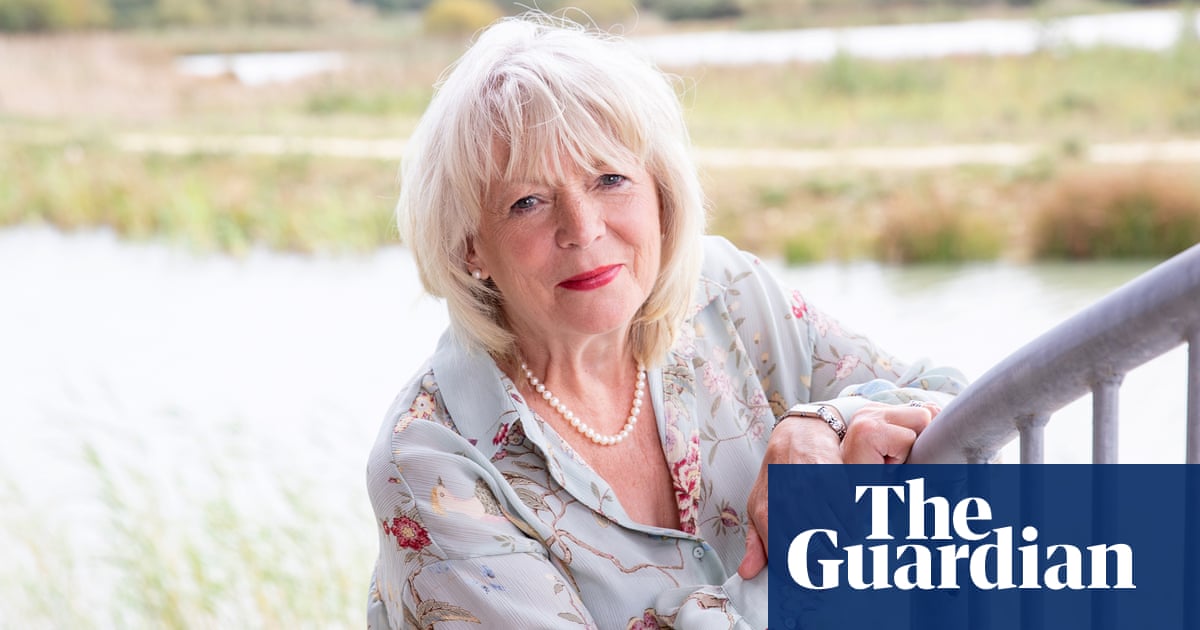
In June, Aimee Lou Wood, 26, won a Bafta for best female performance in a comedy programme for her role as another Aimee (a teenager) in the hit Netflix show Sex Education, about a set of sexually active high school students, now returning for a third series. Even before the Bafta, Wood was always being stopped in the street. Fans wanted to talk to her, about Sex Education, about everything, because they related to her so strongly. Wood is naturally so friendly, she’d engage in conversation and make herself late. Then she starred opposite Bill Nighy in the forthcoming Oliver Hermanus film, Living: “Obviously, every single person recognises Bill Nighy, and he handles it with such grace,” Wood says, when we meet to talk in a north London photo studio. “With people in the street, I was like [she mock hyperventilates]: ‘Did I say the right thing? Was I nice enough?’ Now I’m learning to be: ‘Thank you so much!’ and carry on walking.”
It’s easy to see why fans relate to Wood: never mind the dazzling prettiness, she’s sparky, warm and expressive. She comes from a working-class family in Stockport, Greater Manchester, and although, following her parents’ divorce, her mother’s new partner paid for her to attend a private secondary school, she kept her rich Mancunian tones: “I sound like my mum and I like that. I like that I sound like where I’m from.”
She trained at Rada and has a background in theatre; “Sex Ed”, as Wood calls it, was her first television job. “It’s really funny how quickly it becomes ‘TV star’,” Wood laughs, “and [snooty] ‘A TV star going into the theatre?’ I’m like: ‘I was doing this before!’”
She made her stage debut in Mary Stuart at the Almeida, going on to appear in Bruce Norris’s Downstate at the Steppenwolf theatre in Chicago and at the National in London. Last year, Wood played Sonya, all bruised vulnerability, in the lockdown-interrupted production of Chekhov’s Uncle Vanya, which was filmed in the empty Harold Pinter theatre by the BBC.
“I love doing all of it – TV, film and theatre,” she says, but she particularly loves theatre: “You go back to the same story. You can say the same line 70 times, and then, one night, it means something completely different.” She’s keen to ensure that she doesn’t stay away from live performance so long that she develops stage fright, as she did when Downstate came to London: “In Chicago, everyone was there to watch this amazing Steppenwolf ensemble, no one gave a shiny shite about me; it was so liberating. At the National, it’s [ominous tones]: ‘Aimee from Sex Education is playing this part.’” She felt the weight of her celebrity? “Exactly! Eventually, autopilot took over, but I’d never experienced stage fright like it. I felt so observed.”
Wood was amazed by the Bafta, but you only have to watch Sex Education to realise that she’s a gifted, versatile actor, able to mesh her undeniable comedy sparkle with intense storylines, seamlessly and credibly. You believe screen-Aimee as she delivers her signature wisecracks, but you also believe her when she flails in darker waters. Wood was thrilled to be reunited with the Sex Education cast for series three (filming under strict Covid guidelines). She’s now split from co-star Connor Swindells, whom she’d met on the show, but Wood says it wasn’t a toxic break-up: “We have a mutual respect and we want the best for each other.” How does she feel about performing the show’s notoriously explosive sex scenes? Wood points out that Sex Education was the first to hire an intimacy coordinator – of everything she’s had to do, she found a masturbation scene to be the most nerve-racking: “You’re by yourself, you don’t have another actor to joke with: ‘This is a bit awkward!’”
In the second series, Aimee was sexually assaulted on a bus (one moving scene depicted her friends travelling on the bus to support her); in the third, she’s still struggling and seeks help from the show’s sex therapist, played by Gillian Anderson. Wood was glad that Aimee’s reaction to the assault kept developing, to better reflect the experiences of real-life assault survivors: “It can’t just be resolved [she airily sweeps a hand] – all the girls get on the bus with her and she’s over it… She needed to hear someone say: it’s OK that you’re forever changed.” As someone obviously thoughtful and engaged herself, Wood is pleased to see Aimee evolving: “Especially in season three, she goes on this real thing with her feminism, starting to really love her vulva. She becomes a feminist icon without having a fucking clue, and that’s what’s so funny about her.” Wood shares Aimee’s humour, but she’s aware of the pitfalls of that: “I used to be very much like Aimee in the sense that I only wanted one side of myself to be shown, which was: ‘I’m the court jester!’ But I was in so much pain underneath it all.”
Wood thinks Sex Education is so successful because it encapsulates being young: “When you’re a teenager, everything feels like the end of the world: it’s high stakes Arthur Miller-Shakespearean drama!” She’s spoken before about her own turbulent upbringing, in part due to her father’s drug and alcohol addictions and subsequent erratic behaviour. Today, apart from a brief allusion to “family stuff”, all this is (politely, firmly) a no-go area for discussion. Wood was also bullied in her youth, about her body, her teeth – the stuff that now inspires her fans. Her self-image was so skewed that she initially auditioned for another Sex Education character, not even considering herself for Aimee: “I always used to say: ‘I will never get a job on TV because I’m too weird looking.’ Anyone who’s been bullied knows what it’s like to hear these things, to internalise it and turn it in on yourself and go: ‘If I was just less ugly, just less this, just more this…’”
Wood also suffered from anorexia and bulimia. When the problem was spotted at Rada, she was called to the office, which she now views as “harsh but necessary”. Did she resent it at the time? “Oh my God, I hated them. I had a completely blank face, but inside, this internal anger was like: ‘How dare you do this to me?’” Wood has since committed to therapy and has a deeper understanding of how lodged emotion, stifled anger and people-pleasing trigger her disorders: “I always know if I’ve had a particularly people please-y time. Suddenly, I’m not eating. Or I have that feeling: ‘I have to make myself sick!’ You’ve compromised your integrity, or you’ve not expressed yourself, then it’s all built up, and it’s the inward ‘Here we go.’”
For now, though, there’s this seemingly unstoppable uphill career trajectory. Wood just wrapped on Living, with Nighy, her first lead film role, adapted from the 1952 Japanese film Ikiru, with a screenplay by Kazuo Ishiguro. There’s another smaller role in The Electrical Life of Louis Wain, starring Benedict Cumberbatch and Claire Foy. Wood also feels better about herself – she no longer stifles her emotions: “I cry at everything now. If I read a poem that moves me, I’m sobbing. It’s like this dam’s burst. I feel very connected and I’m not embarrassed.” Wood smiles: “I think that’s what life is: happy and sad, bittersweet. It’s everything all at once.”












